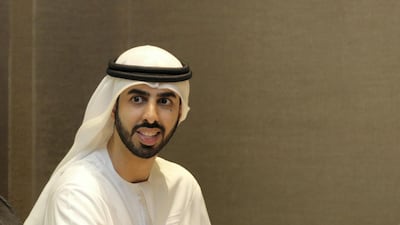Artificial Intelligence can help solve some of the world’s problems rather than pose a threat to humanity, says the world’s first government minister appointed to deal with the technology.
Speaking for the first time since his appointment to the UAE Cabinet, Omar bin Sultan Al Olama, Minister of State for Artificial Intelligence, said he did not believe the world would “see the negative any time soon".
His appointment comes against a backdrop of global debate about advances in artificial intelligence and the potential for many traditional jobs to be lost.
“Everyone is looking at AI either as a utopian or dystopian scenario, either good or bad,” the minister said.
“I think Artificial Intelligence as it exists today is very narrow, with the things it can do.”
The minister was speaking in Abu Dhabi at a panel discussion for the 2018 Zayed Future Energy Prize, just hours after being sworn into his new post.
He spoke of his optimism about the value of AI in solving issues like climate change, rather than creating a world in which it poses a threat to mankind, as scientists like Stephen Hawking have predicted.
Such issues “are still a long time away”, the Minister said. Instead, the value of artificial intelligence could be to “offer the quick win the world needs” on the challenge of climate change.
____________
Read more
More women than the White House, and the youngest minister in the world - meet the new UAE Cabinet
____________
With a prediction that $23 trillion dollars would need to be spent on improving global energy infrastructure, artificial intelligence can he said “help us consume it more efficiently, distribute it more efficiently and at the same time help us find solutions for storage.”
Another role could be the processing of huge amounts of data that would otherwise take scientists a lifetime to examine.
This year marks the 10th anniversary of the establishment of the Zayed Future Energy Prize. Organisers estimated it has positively impacted 289 million people worldwide, through projects that have saved an estimated one billion tonnes of CO2, supplied clean renewable energy to 40 million homes and given clean drinking water to over seven million.
The jury for the prize is now selecting nine winners in five categories out of a record number of 2,296 entries from more than 112 countries worldwide. The winners will be announced in January.
____________
Read more
Too cool for a school: Bangladeshi pupils set for traditional Arab wind towers
____________
The chair of the jury Ólafur Ragnar Grímsson, the former president of Iceland, said the impact of the prize over ten years had been to show what can be achieved with clean renewable energy.
“We have been able to demonstrate to the world that this urgently needed energy transformation is a reality and should be celebrated,” he said.
“Truly the prize has given us a very optimistic message, that change is not only necessary but is possible and is in fact happening at many different levels all over the world.”
He also praised the role of youth in the prize.
Mr Al Olama, who is 27, said young people would determine the future.
“Youth are the drivers. Technology will always be the enabler but it will not be the driver,” the minister said.
“The driver is youth, the people who willing to make difference.
“Youth is not an age, it’s a mind-set, So if you are willing to help, willing to make a change then you are always part of the youth, even if you 100 years old.”















